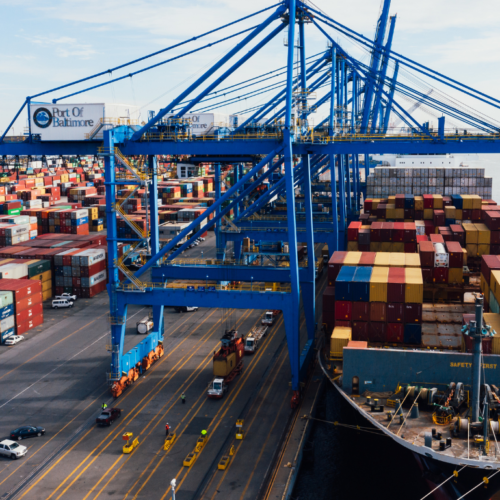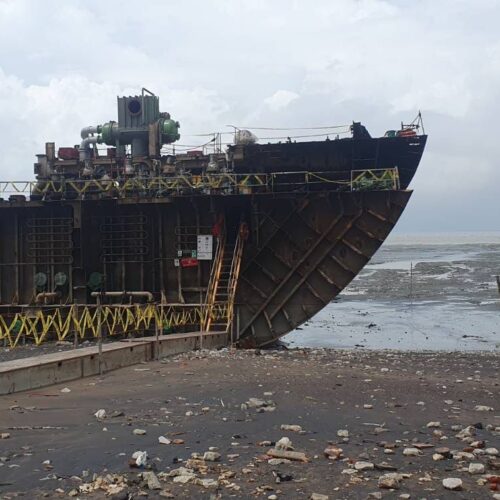Press Release – Norwegian Altera Infrastructure fined for beaching two ships in India
Trafficking toxic ships is an international environmental crime
Following a raid on Altera’s office four years ago, the Norwegian National Authority for Investigation and Prosecution of Economic and Environmental Crime (Økokrim) issued a fine of NOK 8 million (approx. EUR 700,000) on 10 June to Norwegian shipping company Altera Infrastructure for having sold two vessels for scrapping India.
Økokrim is holding Altera Infrastructure, formerly known as Teekay Offshore, liable for the illegal export of the shuttle tankers NAVION BRITANNIA and ALEXITA SPIRIT. Both tankers were sold to cash buyer Wirana and beached in Alang, India, where they were scrapped under conditions that expose fragile ecosystems and workers to harm.
Police attorney Maria Bache Dahl stated that “Økokrim takes a serious view on the export of Norwegian operated end-of-life vessels to developing countries with far weaker legislation and enforcement mechanisms than what exists in Norway”. According to European and international law, hazardous waste, including end-of-life ships, cannot be exported from an EU/EFTA country to a non-OECD country under any circumstances.
Altera claims that they had intended to retro-fit the shuttle tankers. However, they sold the NAVION BRITANNIA and ALEXITA SPIRIT, as well as two other shuttle tankers, NORDIC SPIRIT and NAVION MARITA, to one of the most notorious cash buyers: Wirana, a scrap dealer specialised in the purchase of end-of-life vessels and known as middle-man for the South Asian beaching yards.

Altera, which has two weeks to appeal, is not the first company to face this type of charges. In recent years, several ship owners and individuals have been held liable by European Courts for violating international and European waste laws. In 2022, the Norwegian Supreme Court upheld a six month prison sentence for ship owner Georg Eide, after he attempted to illegally export of a vessel for scrapping in Pakistan. Wirana was also the cash buyer in that case and received a fine of NOK 7 million. Dutch ship owners, including Seatrade and Jumbo, have paid similar fines, while Maran Tankers settled a compensation claim brought by the wife of a deceased Bangladeshi worker after the UK High Court confirmed that Maran Tankers likely did have an obligation to conduct due diligence when selling ships for scrap, and thus could be held liable for injury and death of workers when notoriously unsafe shipbreaking yards were selected. In the summer of 2021, the offices of several Hamburg-based ship owners were raided by the German police, and while investigations are ongoing, the Hamburg Public Prosecutor has pressed charges against three people for ship owner Peter Dohle Schiffahrts’ illegal scrapping of containership CS Discovery in India. In the UK and Iceland, cases involving another notorious cash buyer, GMS, are also still under investigation.

Related news

Press Release – The EU agrees: the recycling of ships is a matter of global environmental justice
The Basel Convention’s ban on the export of toxic ships to developing countries reestablished
... Read More
Platform News – NGO Shipbreaking Platform presents Annual Report 2016
The NGO Shipbreaking Platform presents its Annual Report 2016. Last year, at least 52 workers lost their lives on the shipbreaking beaches in South Asia. The… Read More

Platform News – Performance With Bare Hands (Live) in Brussels
The NGO Shipbreaking Platform invites you to attend the artistic performance With Bare Hands (Live) on Friday 21 June in Brussels (Belgium).
... Read More
Platform News – UN Special Rapporteur concerned about German shipbreaking practices
In a written submission to the German Government, UN Special Rapporteur Baskut Tuncak has expressed serious concerns related to the substandard shipbreaking practices of German ship owners,… Read More

Press Release – NGOs organise event on sustainable maritime transport on 31 May in Lisbon
On 31 May, between 2PM and 7:30PM, the NGOs ZERO, Sciaena, NGO Shipbreaking Platform and Circular Economy Portugal are organising the conference “Waves of change: towards circular… Read More

Press Release – Brazilian Navy suddenly seizes its old warship forcing it to sea
NGOs urgently call on President Lula to prevent Navy from sinking toxic ship in the Atlantic.
... Read More
Press Release – Recent fires at Gadani yards prompt authorities to shut down all shipbreaking activities
On 11 October a tanker caught fire at the Gadani shipbreaking beach that holds a deplorable record of life threatening accidents. Fortunately, no casualties were recorded. Only… Read More

